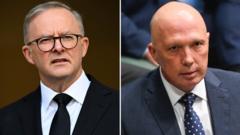Australia is set to hold its federal election on May 3, with Prime Minister Anthony Albanese facing tough competition from opposition leader Peter Dutton.
Australia's Federal Election Announced for May 3

Australia's Federal Election Announced for May 3
Prime Minister Anthony Albanese sets the stage for a highly competitive election amid rising living costs and shifting voter priorities.
The election announcement was made by Prime Minister Anthony Albanese after a visit to the Governor General in Canberra, marking a pivotal moment as Australians prepare to cast their votes. The upcoming election will see the Labor Party defending a slim three-seat majority. As the political landscape grows increasingly competitive, opinion polls suggest a tight race between Labor and the Liberal-National coalition, with the potential for independent MPs and minor parties to play a crucial role in forming the next government – a possibility heightened by the record voter turnout for these groups in the 2022 election.
Key issues on voters' minds include rising costs of living reflected in housing and grocery prices, access to healthcare, and an intensifying focus on crime and immigration management. Climate action remains a significant concern for many constituents, following its prominence in past campaigns. Albanese has laid out plans to tackle these issues, proposing measures such as more accessible healthcare and modest tax reductions, while cautioning against a return to the leadership of Peter Dutton, whom he claims would lead the country backward.
In contemporary Australian politics, the Labor Party and the Liberal-National coalition have historically dominated. Winning at least 76 out of 150 House of Representatives seats is critical for either party aiming to establish a majority government. Since assuming office in 2022 amidst a phase of political turbulence, Albanese has aimed to unify a divided nation, especially following a decade characterized by frequent leadership changes. His government took steps to bolster climate policies with a legally binding emissions target but faced setbacks, including failed attempts to secure constitutional recognition for Aboriginals and Torres Strait Islanders.
Albanese's leadership is scrutinized against a backdrop of global economic challenges, which have exacerbated living expenses, a phenomenon that has led to the downfall of numerous global governments. Dutton, the leader of the opposition, comes with a background as a former police officer, bringing over 20 years of political experience. Known for his conservative stance and controversial immigration policies, Dutton is seeking to redefine his public image while promising to restore national order and address economic issues.
As Australia gears up for this significant electoral showdown, voters appear poised to influence the future direction of the country, with the potential for a shake-up in traditional party dynamics.
Key issues on voters' minds include rising costs of living reflected in housing and grocery prices, access to healthcare, and an intensifying focus on crime and immigration management. Climate action remains a significant concern for many constituents, following its prominence in past campaigns. Albanese has laid out plans to tackle these issues, proposing measures such as more accessible healthcare and modest tax reductions, while cautioning against a return to the leadership of Peter Dutton, whom he claims would lead the country backward.
In contemporary Australian politics, the Labor Party and the Liberal-National coalition have historically dominated. Winning at least 76 out of 150 House of Representatives seats is critical for either party aiming to establish a majority government. Since assuming office in 2022 amidst a phase of political turbulence, Albanese has aimed to unify a divided nation, especially following a decade characterized by frequent leadership changes. His government took steps to bolster climate policies with a legally binding emissions target but faced setbacks, including failed attempts to secure constitutional recognition for Aboriginals and Torres Strait Islanders.
Albanese's leadership is scrutinized against a backdrop of global economic challenges, which have exacerbated living expenses, a phenomenon that has led to the downfall of numerous global governments. Dutton, the leader of the opposition, comes with a background as a former police officer, bringing over 20 years of political experience. Known for his conservative stance and controversial immigration policies, Dutton is seeking to redefine his public image while promising to restore national order and address economic issues.
As Australia gears up for this significant electoral showdown, voters appear poised to influence the future direction of the country, with the potential for a shake-up in traditional party dynamics.






















